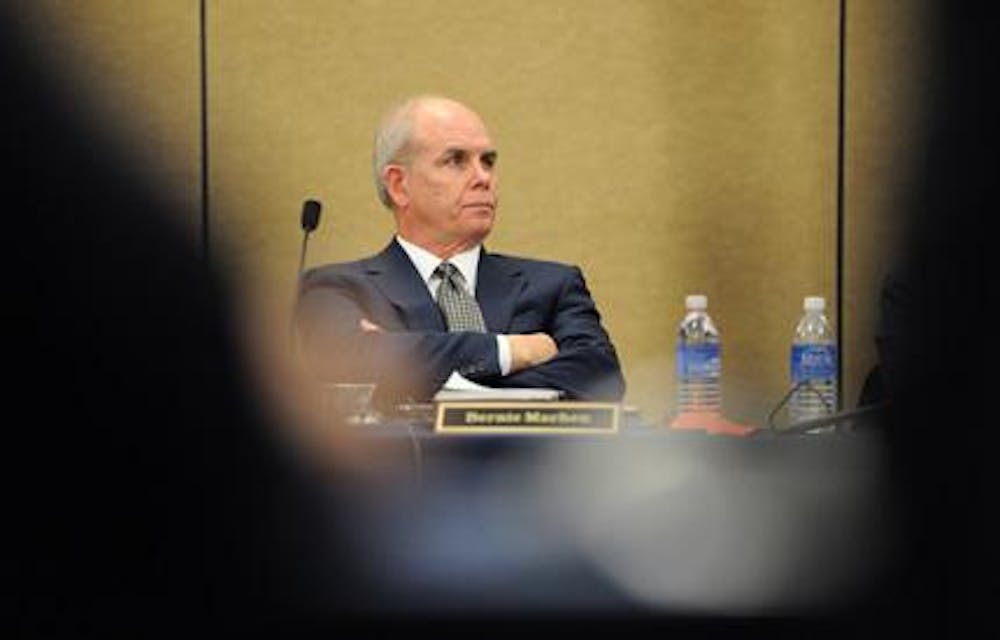Just in time for the holidays, Bernie's giving back.
About 10 minutes after the Board of Trustees, UF's highest governing body, voted Monday to give UF President Bernie Machen performance bonuses totaling $285,000, Machen announced he was donating the money to UF.
Machen told the board he and his wife, Chris, would give "at least" the amount of the bonus to the Florida Opportunity Scholars Program, which gives financial aid to first-generation Florida students whose household income is less than $40,000 a year.
Like last year, the only member to vote against the extra pay was Trustee Al Warrington. Before voting on Machen's bonus, the board also voted to increase dorm rent by $40 in the spring and increase student fees by nearly $2 per credit hour.
Bonus Points
After the meeting, Machen said his decision to donate his bonus had nothing to do with critics who have complained about the size of his bonus in light of recent budget cuts.
"No, I earned it," he said.
He also rejected the idea that he was following in the footsteps of other university presidents, such as University of Central Florida President John Hitt, who have denied raises or given back bonuses.
"This is something Chris and I wanted to do," he said.
Machen said he doesn't think university presidents are overpaid.
"I think it's the hardest job I've ever had," he said. "I think that most university presidents work very hard for what they get."
According to figures provided by Brian Beach, UF's interim senior vice president, Machen is eligible for just over $1 million in compensation in 2008-2009.
But Machen said he may only receive about $700,000. He said he has the option of receiving the rest but may decide to wait.
A November Chronicle of Higher Education report listed Machen as the highest paid president in Florida and the eighth highest paid in the U.S. in the 2007-2008 fiscal year.
Only $225,000 of Machen's salary comes from state funds, the rest comes from Shands HealthCare, the UF Foundation and the University Athletic Association.
Machen's donation, which he said will likely be spread over several semesters, follows the announcement in October of a $50 million fund-raising initiative by head coaches Urban Meyer and Billy Donovan.
Machen said his donation is separate from their campaign.
"I hope Urban will raise his own $50 million," he said. "This is really just to tide us through the next year or so."
Machen said he would like to see the program, which he created in 2006, accept 400 more students in 2009-2010. It could only accept about 330 in 2008-2009 because of a lack of funding, he said. About 1,100 students are currently enrolled, according to a UF news release.
Costs for the program are expected to jump from almost $6 million to almost $8 million next academic year, according to the release.
UF has raised about $5.4 million in donations for the program since its start in 2006 and about $144,000 since Meyer and Donovan announced their fund-raising effort in October, said Chris Brazda, the UF Foundation spokesman.
The scholarships, which cover tuition, books, and room and board, are funded by a mix of money from UF, the state and the University Athletic Association.
Board members evaluated Machen's performance in the 2007-2008 academic year to decide whether to award the bonus. The evaluation included a consideration of his progress on a number of one-year and three-year goals agreed to by Machen and the board.
The goals, which were for 2007-2008, included maintaining average SAT scores of incoming freshman and providing faculty and staff with raises.
In his self-assessment, Machen noted the year included a number of unfortunate events, including a record number of student deaths, the lack of a national sports championship and the Andrew Meyer Taser incident.
Despite all that, the board determined that Machen only failed to meet two of the goals discussed on Monday: increasing research grants and awards and increasing the number of Hispanic and black incoming freshmen.
The board noted that research awards declined from $583 million in 2006-2007 to $562 million in 2007-2008, and the percentage of incoming Hispanic and black freshmen declined from 28 percent to 26 percent.
In voting against giving Machen the bonus, Warrington said he couldn't justify the reward while UF is drastically cutting its budget and faculty are being laid off.
He said he thinks Machen has done an excellent job in tough times.
"I want to make it clear I am not voting against that bonus based on merit," he said. "I give him nothing but high marks."
But in the corporate world, he said, bonuses are "a thing of the past, except in exceptional circumstances."
In the future, he said he would be more inclined to give Machen his bonus.
"There's better times ahead," he said. "Certainly he's deserving when those times return."
In response, Trustee Steve Scott said this is an exceptional circumstance, and he is especially impressed with the way Machen was able to give faculty and staff pay raises this year in the midst of large budget cuts.
Higher Fees, Higher Rent
Before the vote on Machen's bonus, the board voted to increase the Student Activity & Service Fee, the Student Health Fee and the Transportation Access Fee a combined $1.77 per credit hour. The increase will bring UF an additional $2.3 million in revenue, according to UF officials.
Part of the increase in the Student Health Fee will go toward hiring two full-time counselors in UF's Counseling Center.
Sherry Benton, the director of the center, said adding two counselors to the 12 they already have is a huge deal. However, the hires may be negated by potential laid-off counselors due to 2009-2010 budget cuts, she said.
More counselors would mean shorter wait times for students, which could be crucial.
"A student who's depressed, who waits three weeks, they'd lose their whole semester," she said. "They just can't afford to wait."
The board also voted to increase dorm rent by $10 a month, or $40 total, in the spring, due to record increases in utilities.
The increase will bring in an estimated $294,240 in additional revenue in the spring to cover an estimated $250,000 to $300,000 increase in utilities, according to board documents.
Norbert Dunkel, the assistant vice president and director of Housing and Residence Education, said bills for the increase would be mailed to dorm residents this week and would be due in a month.






